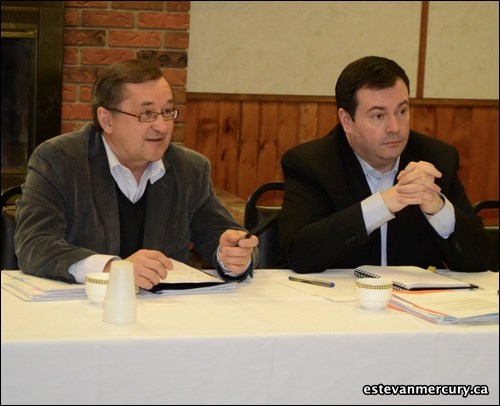The labour shortage in southeast Saskatchewan has been well known in this area for some time. However, it is now drawing the attention of the federal government.
Jason Kenney, the federal minister for Citizenship, Immigration and Multiculturalism, was in Estevan Saturday with Souris-Moose Mountain MP Ed Komarnicki to discuss the issue.
Kenney and Komarnicki held a round-table discussion with a number of local business owners where the focus was on skilled and low skilled labour shortages in the area and the programs in place to address them.
The Calgary-based MP, who came to Estevan at the request of Komarnicki, said the government has been aware of the labour shortage for awhile and is trying to solve the problem.
"The good news is our government has helped to quadruple immigration levels to Saskatchewan in the past four years and fill a lot of the temporary shortages through our temporary worker program," Kenney said. "We are looking at other ways we can fill the job shortages and build the population and the prosperity of southeast Saskatchewan."
Among the avenues the government is looking at to help the situation is the reduction of red tape. Kenney noted that under the temporary worker program, after an employee has been in the country for a year, an employer then has to go back to two levels of government and fill out a pile of paperwork to get that employee to work a second year.
"But 97 per cent of them are approved anyway so what we are looking at, for example is saying, let's give them a two year permit instead of a one year permit and cut out a whole lot of red tape," he said. "We'll be making some announcements this spring about a little more flexibility in the way those programs are run because we know a lot of these businesses are mom and pop operations, they are owner-operator small businesses and they don't have the big human resource departments to go around recruiting people."
Kenney cautioned that as much as the government might try to simplify the process, they must also ensure that Canadians get the first crack at any available jobs.
"We need certain parameters, we need to keep certain rules in place for sure, but those rules should be flexible enough that if a Canadian is not taking the job, someone from overseas that is willing to work will do so."
Although many in the region have turned towards the foreign labour market, it has been well documented that many in Eastern Canada are out of work but unwilling to move west where the jobs are.
Kenney said he is frustrated by that attitude and noted the government is taking a look at those workers and how they can help the situation here.
"That is a serious problem," he said. "Many years ago the government offered a moving allowance to move people to a different part of the country but that didn't really work. We have brought in a tax write-off to help prime the pump a little bit to get people to move from areas of high unemployment to low unemployment, but at the end of the day, the main thing that will cause people to move from, let's say Eastern Canada to the Prairies is wage levels.
"What we have found is people from, for example, Newfoundland and Cape Breton are flying up to the Athabasca region of Alberta in pretty large numbers to work in jobs that are paying $70 to $80 an hour. When the wages get to a certain point, people will move and do the work."
Kenney added the government is also looking at ways to get more Americans to come north and fill some of the openings, much of which involve reducing red tape.
"If you're running, like some of these guys here, a trucking operation and you need semi skilled people and time and again you are putting ads in the paper and no Canadian is applying, eventually we in the government should say 'you've got Americans applying and Canadians are not, let the Americans come in and do that work.' At the end of the day that is good for everyone here because it keeps the economy rolling."
Komarnicki said he was pleased the minster was able to visit the area and hear the concerns of local businesspeople. He said many of the comments during the meeting indicated the government is on the right track but would like to see further improvements.
"They are anxious to have their positions filled and they don't want a lot of red tape or bureaucracy to do that," Komarnicki said. "It was a great opportunity for them to air their concerns at the highest of levels to the minister who deals with some of these issues. Hopefully we will see some modifications and changes to make it easier and to look at the expanding businesses that are really in need of all kinds of labour. In the southeast, business has really been expanding a lot over the last number of years and it doesn't seem like it is going to stop."
Kenney also commended Komarnicki for his work while he was the parliamentary secretary to the minister of immigration and later for human resources, noting that immigration levels have quadrupled in Saskatchewan since Komarnicki worked on the portfolio and that he was an advocate for changes to the system.



